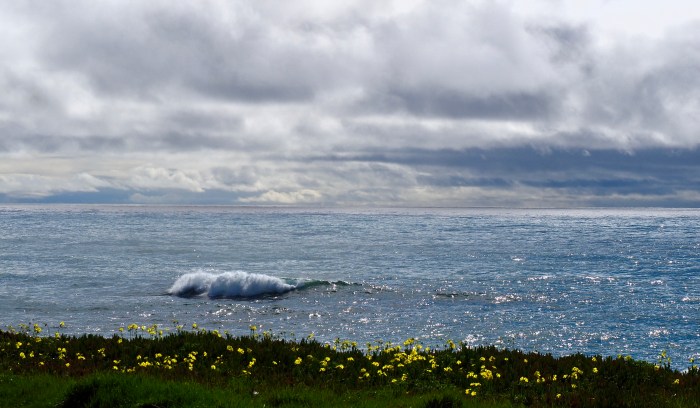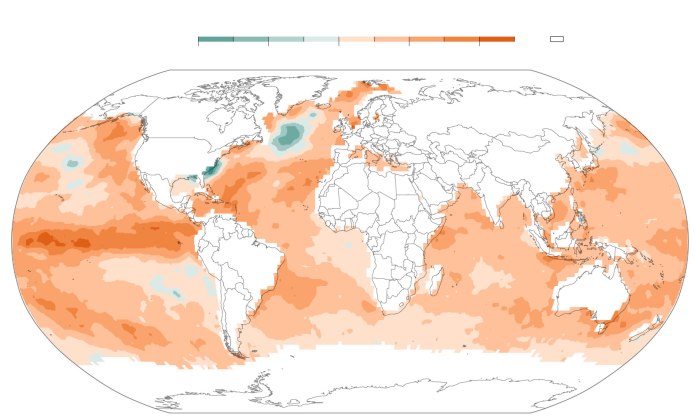
“The global ocean has warmed substantially over the past century, with far-reaching implications for marine ecosystems” C. Coimbra photo
–from the New York Times, March 4, 2019
When deadly heat waves hit on land, we hear about them. But the oceans can have heat waves, too. They are now happening far more frequently than they did last century and are harming marine life, according to a new study.

The average number of marine heat wave days for the period 1987-2016, compared to the average for 1925-1954. Source: Nature Climate Change | By The New York Times
The study, published Monday in the journal Nature Climate Change, looked at the impact of marine heat waves on the diversity of life in the ocean. From coral reefs to kelp forests to sea grass beds, researchers found that these heat waves were destroying the framework of many ocean ecosystems.
Marine heat waves are said to occur when sea temperatures are much warmer than normal for at least five consecutive days.
Scientists estimate that the oceans have absorbed more than 90 percent of the heat trapped by excess greenhouse gases since midcentury. Humans have added these gases to the atmosphere largely by burning fossil fuels, like coal and natural gas, for energy.


An earlier study by some of the same researchers found that, from 1925 to 2016, marine heat waves became, on average, 34 percent more frequent and 17 percent longer. Over all, there were 54 percent more days per year with marine heat waves globally.
The most severe years tended to be El Niño years. Warmer ocean temperatures are one of the characteristics of an El Niño pattern.
“There’s also some indication that El Niños have been getting more extreme with climate change,” said Eric C. J. Oliver, an assistant professor of physical oceanography at Dalhousie University in Halifax, Nova Scotia, who was a co-author of the study. But regional marine heat waves can happen even without an El Niño, he said.


As ocean heat waves proliferate, problems will mount for people who depend on fishing and fish farming, or aquaculture, said Gretchen Hofmann, chairwoman of the department of ecology, evolution and marine biology at the University of California, Santa Barbara.
The study’s authors found many parts of the Pacific, Atlantic and Indian Oceans where aquatic life was especially vulnerable. These areas were home to a lot of biological diversity and had plants and animals that were already living in the warmer parts of their ranges. They were also affected by other human impacts like pollution and overfishing.
Even seabirds did not emerge from marine heat waves unscathed, most likely because their food sources either died off or moved in response to the warming.


But perhaps the biggest surprise was the significant loss of what biologists call foundational species, like coral reefs, sea grasses and kelp forests. They support the diversity of aquatic life by providing shelter from predators, moderating temperatures and acting as food sources. When they disappear, the entire ecosystem disappears along with them.
Climate change “may be a gradual process, but set on that backdrop are these extreme warming events that might be becoming more common that can have more dramatic consequences,” said Robert Miller, an associate research biologist at the Marine Science Institute of the University of California, Santa Barbara, who was not involved in the study.
“In some cases ecosystems might not be able to recover from those events,” he said. “And so, the effects of climate change might happen a lot sooner than we expect.”
For more news on climate and the environment, follow @NYTClimate on Twitter.
Kendra Pierre-Louis is a reporter on the climate team. Before joining The Times in 2017, she covered science and the environment for Popular Science. @kendrawrites
Nadja Popovich is a reporter and graphics editor on The Times’s climate team. @popovichN
Categories: Climate Change, Condition of Oceans, Coral Reefs, El Nino, Marine Heat Wave, Warming Oceans
Leave a comment